|
|
|
Sort Order |
|
|
|
Items / Page
|
|
|
|
|
|
|
| Srl | Item |
| 1 |
ID:
133755
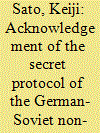

|
|
|
|
|
| Publication |
2014.
|
| Summary/Abstract |
In June 1989, the First Congress of People's Deputies of the Soviet Union established the Commission for Historical and Legal Estimation of the Soviet-German Non-aggression Pact of 1939. In the commission, representatives from Estonia, Latvia and Lithuania condemned the Soviet annexation of the Baltic States, prompting heated arguments regarding the invalidity of the related secret protocol of the pact with other members who continued to hold the traditional Soviet ideological view of the pact as something positive. The debate over the secret protocol had the further potential to extend to disputes over 'recovery of lost territory' amongst the Baltic States, Ukraine, Moldova, Belarus and Russia. This article analyses the arguments used by commission members, considering the interplay of national interests, how they balanced arguments between restoration of 'state sovereignty' and maintenance of borders, and how they finally compromised and concluded the commission's report.
|
|
|
|
|
|
|
|
|
|
|
|
|
|
|
|
| 2 |
ID:
117368
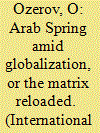

|
|
|
|
|
| Publication |
2012.
|
| Summary/Abstract |
IN ANTIQUITY, all armies had listening sentries who put ears to the ground to discern the stamping of hooves of an approaching enemy; later, they were monitoring radio exchange or trying to catch the noise of approaching airplanes. Today, it looks like the fast changing world is missing such real pros. However, there is no shortage of fortune tellers, soothsayers and financial analysts who are no better than psychics and astrologists.
|
|
|
|
|
|
|
|
|
|
|
|
|
|
|
|
| 3 |
ID:
092999
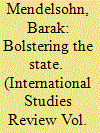

|
|
|
|
|
| Publication |
2009.
|
| Summary/Abstract |
Looking beyond the military component of the global war on terrorism this article identifies a multilateral and multidimensional effort to revamp the state-based order. This effort is guided by four principles: (i) states are the primary actors in the confrontation with the jihadi movement, and state sovereignty must be respected in the various cooperative counterterrorism efforts; (ii) as members in the international society, states hold obligations to the collective not to allow terrorists to use their territories to harm other states; (iii) because numerous states are weak, a special effort must be made to bolster states' capacities so that they will be able to realize their obligations to the society of states; and (iv) the enormous demands of capacity building necessitate particular emphasis on interstate cooperation, including the provision of assistance for weak states and sharing of best practices. The article then presents two spheres of action in the war on terrorism, indicative of this general design: the regime to suppress the financing of terrorism and states' efforts to reinforce control over their borders. It concludes by arguing that the implications of the efforts to reinforce the state-based order require that we pay it much closer attention.
|
|
|
|
|
|
|
|
|
|
|
|
|
|
|
|
| 4 |
ID:
108906
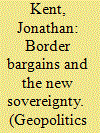

|
|
|
|
|
| Publication |
2011.
|
| Summary/Abstract |
From 2001 to 2005 Canada and the US dramatically altered the way each country views its border. In response to the attacks on New York City and Washington DC, Canada and the US entered into three important partnerships: the Smart Borders Agreement (SBA), the Container Security Initiative (CSI), and the Security Prosperity Partnership (SPP). These arrangements will be conceptualised here as "tacit bargains" whereby Canada provided the US with security in hope of renewed trust and economic accessibility. These "tacit bargains" required a concession of traditional state sovereignty so that stable and predictable relations between both countries could continue. While this process is ostensibly a violation of state sovereignty, the argument presented here is that these three "tacit bargains" represent a transition of "old" sovereignty to "new" sovereignty.
|
|
|
|
|
|
|
|
|
|
|
|
|
|
|
|
| 5 |
ID:
069364
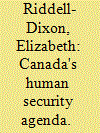

|
|
|
| 6 |
ID:
108082
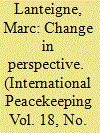

|
|
|
|
|
| Publication |
2011.
|
| Summary/Abstract |
To understand China's change in position regarding UN peacekeeping, the country's internal debates and policy towards the UN operations in East Timor from 1999 to 2002 comprise an essential case study. Despite its traditional concerns about the sanctity of state sovereignty, China was willing to support and contribute personnel to East Timor peacekeeping missions. This was a result of its growing confidence in addressing regional strategic issues, its development of the 'New Security Concept', which encourages cooperative solutions to strategic issues, and its desire to remake its regional identity to reflect a more conservative and pragmatic approach to regional peacebuilding. This change in policy not only allowed China to become more at ease with UN peacekeeping participation, but also contributed much to the country's Asia-Pacific diplomacy, which increasingly stressed multilateralism and partnership.
|
|
|
|
|
|
|
|
|
|
|
|
|
|
|
|
| 7 |
ID:
171830


|
|
|
|
|
| Summary/Abstract |
Despite suggestions that international investment disputes impose a chilling effect on governments’ autonomy to set regulatory policies, we lack empirical confirmation of the phenomenon and what explains its heterogeneity across countries. Using a novel dataset of nine anti-smoking regulations in ninety-two countries from 1973 to 2016, I confirm the presence of the chilling effect, but also its boundaries. I show that countries have been significantly slower in implementing two anti-smoking policies formally challenged under investment law, while the adoption of seven undisputed regulations in this issue area continued unimpeded. Qualitative evidence from respondent and third-party governments confirm the policy-specificity of the chilling effect and show that both developed and developing countries were affected by the chill, albeit differently. By providing the first empirical confirmation of a regulatory chill and by defining its limited scope in one of the most high-profiled international investment disputes to date, my findings indicate that, even though multinational corporations can constrain state sovereignty, their effects are not necessarily expansive or indefinite.
|
|
|
|
|
|
|
|
|
|
|
|
|
|
|
|
| 8 |
ID:
072481
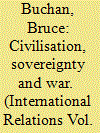

|
|
|
|
|
| Publication |
2006.
|
| Summary/Abstract |
In recent international relations (IR) literature and foreign policy, the concept of civilisation has enjoyed a surprising revival. Its recent use, however, has had little reference to those who did most to introduce it into modern thought, the thinkers of the Scottish Enlightenment. A re-examination of their thought suggests the need for a more nuanced view of civilisation, one that appreciates that the promise of domestic peace that comes with civilisation is also laden with the peril of war and new dynamics of international order. This article will focus on how David Hume (1711-76), William Robertson (1721-93), Adam Smith (1723-90) and Adam Ferguson (1723-1816) framed their understanding of civilisation and the civilising process in Europe. It will be argued that they were animated by the need to identify the processes at work in reshaping Europe, giving rise to a new international order of civilised societies and mighty sovereign states. Civilisation thus emerged as a process not simply of domestic refinement and pacification, but of the emergence of a new kind of international order between militarily powerful, 'civilised' and 'civilising' sovereign states with enhanced capacities for waging war.
|
|
|
|
|
|
|
|
|
|
|
|
|
|
|
|
| 9 |
ID:
171922
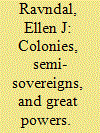

|
|
|
|
|
| Summary/Abstract |
How did the transition from a world of empire to a global international system organised around the sovereign state play out? This article traces the transition over the past two centuries through an examination of membership debates in two prominent intergovernmental organisations (IGOs). IGOs are sites of contestation that play a role in the constitution of the international system. Discussions within IGOs reflect and shape broader international norms, and are one mechanism through which the international system determines questions of membership and attendant rights and obligations. The article reveals that IGO membership policies during this period reflected different compromises between the three competing principles of great power privilege, the ‘standard of civilisation’, and universal sovereign equality. The article contributes to Global IR as it confirms that non-Western agency was crucial in bringing about this transition. States in Africa, Asia, and Latin America championed the adoption of the sovereignty criterion. In this, paradoxically, one of the core constitutional norms of the ‘European’ international system – the principle of sovereign equality – was realised at the hands of non-European actors.
|
|
|
|
|
|
|
|
|
|
|
|
|
|
|
|
| 10 |
ID:
099914
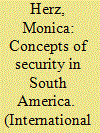

|
|
|
|
|
| Publication |
2010.
|
| Summary/Abstract |
The article analyses the framing of themes and issues in terms of security in South America and the potential support for intervention in the region. The argument is developed that five elements contribute to understanding attitudes toward intervention in the region: the wider interest in the security sphere among South American elites as the Cold War drew to an end; the concern with the distribution of power in the international system; the portrayal of South America as a zone of peace; the broadening of the concept of security; and the centrality of the concept of state sovereignty.
|
|
|
|
|
|
|
|
|
|
|
|
|
|
|
|
| 11 |
ID:
095023


|
|
|
|
|
| Publication |
2010.
|
| Summary/Abstract |
The creation of an International Criminal Court (ICC) to prosecute war crimes poses a real puzzle. Why was it created, and more importantly, why do states agree to join this institution? The ICC represents a serious intrusion into a traditional arena of state sovereignty: the right to administer justice to one's one nationals. Yet more than one hundred states have joined. Social scientists are hardly of one mind about this institution, arguing that it is (alternately) dangerous or irrelevant to achieving its main purposes: justice, peace, and stability. By contrast, we theorize that the ICC is a mechanism to assist states in self-binding, and draw on credible commitments theory to understand who commits to the ICC, and the early consequences of such commitments. This approach explains a counterintuitive finding: the states that are both the least and the most vulnerable to the possibility of an ICC case affecting their citizens have committed most readily to the ICC, while potentially vulnerable states with credible alternative means to hold leaders accountable do not. Similarly, ratification of the ICC is associated with tentative steps toward violence reduction and peace in those countries precisely least likely to be able to commit credibly to foreswear atrocities. These findings support the potential usefulness of the ICC as a mechanism for some governments to commit to ratchet down violence and get on the road to peaceful negotiations.
|
|
|
|
|
|
|
|
|
|
|
|
|
|
|
|
| 12 |
ID:
110889
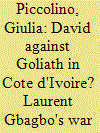

|
|
|
|
|
| Publication |
2012.
|
| Summary/Abstract |
While a doctrine of liberal interventionism seems to be gaining acceptance, it remains constrained by the resilience of state sovereignty and by the resistance of internal elites to externally driven prescriptions. This article looks at Côte d'Ivoire's tortuous peace process and at the recent post-electoral crisis, exploring how former Ivoirian President Laurent Gbagbo developed strategies for neutralizing the threat that international peacemaking and peacekeeping intervention posed to his rule. It is argued that a particular ideological discourse played a crucial role in Gbagbo's struggle against 'global governance'. Such a discourse combined the legalistic exaltation of state sovereignty, a fierce anti-colonial nationalism, and religious overtones in portraying the Ivoirian crisis as a 'war of second independence' against a wide range of international enemies. While nationalist rhetoric had been toned down after the conclusion of the Ouagadougou Political Agreement in 2007, the confrontation between Gbagbo and the international community reignited during the 2010-11 post-electoral crisis. A series of new developments - in particular the UN's certification mandate - rendered Gbagbo's political tactics and the recourse to nationalism ineffective and contributed to his fall.
|
|
|
|
|
|
|
|
|
|
|
|
|
|
|
|
| 13 |
ID:
131462
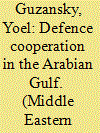

|
|
|
|
|
| Publication |
2014.
|
| Summary/Abstract |
The Arab Gulf states have systematically worked to tighten their cooperation in various fields. However, progress toward increased defence collaboration continues to be slow due to a number of factors including fears of angering neighbouring countries, particularly Iran; protecting state sovereignty; and reliance on other forms of defence, such as national militaries and foreign allies. This article traces the ups and downs of defence cooperation between the Arab Gulf nations, focusing on the establishment of the GCC and the joint Peninsula Shield Force, crucial milestones in Arab Gulf security coordination. A timeline of increased and decreased cooperation is presented, including during the two Gulf wars, along with the manner in which the joint force has been employed, its associated concerns, and the potential future for defence collaboration.
|
|
|
|
|
|
|
|
|
|
|
|
|
|
|
|
| 14 |
ID:
098851


|
|
|
|
|
| Publication |
2010.
|
| Summary/Abstract |
Daniel Deudney's impressive reformulation of republican security theory has rightly garnered a great deal of attention from scholars of international politics. However, a close examination of Deudney's theory reveals that it rests on a series of weaknesses. His defense of a novel form of world state depends on a one-sided interpretation of state sovereignty according to which it functions chiefly as a protective device against external foes, an idiosyncratic rereading of modern republican theory and the US framers, and a highly tendentious view of US history. Notwithstanding his noteworthy attempt to break free from the insularity of US political and intellectual life, Deudney reproduces some elements of it.
|
|
|
|
|
|
|
|
|
|
|
|
|
|
|
|
| 15 |
ID:
052074
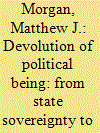

|
|
|
| 16 |
ID:
117912
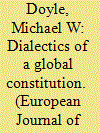

|
|
|
|
|
| Publication |
2012.
|
| Summary/Abstract |
As a decentralized legal order, the international system arguably has no single constitution, but the closest candidate to a constitution that it does have is the UN Charter. Thus it is worth exploring how constitutional the Charter is in theory and practice. Sixty-plus years into its evolution we can see two dominant features. First, its key constitutional elements are: supranationality in its various forms; inequality; and, like all constitutions, an 'invitation to struggle' that leads to inevitable pushback from states when UN authority expands. Second, unlike in many domestic constitutions, the pushback more than holds its own. The UN has neither integrated its parts nor centralized authority. To illustrate those points, I start with a comparison of the UN Charter to both capital 'C' domestic constitutions and to ordinary treaties. I then address with a broad brush the main features of the UN's supranationality and inequality. The Secretariat and its neutrality and independence are the next topics. I then consider two examples of tension between UN supranationality and sovereignty. I explore the trend toward 'global legislation' associated with the Security Council's counter-terrorist resolutions, 1373 and 1540. I then focus on the example of the Millennium Development Goals, the UN's recent attempt to remake itself as a development body. I conclude with a discussion of the wider constitutional significance and prospects of the UN in the light of the contrasting success of the history of US federalism and European integration.
|
|
|
|
|
|
|
|
|
|
|
|
|
|
|
|
| 17 |
ID:
191038
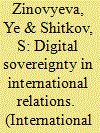

|
|
|
|
|
| Summary/Abstract |
IN THE global digital transformation age, the principle of state sovereignty has acquired an extra, digital dimension. Digital sovereignty, which in the broadest sense means the independence of a country in its digital domestic and foreign policy, is becoming a key criterion for measuring a country's viability, security, and economic status. To better understand the nature of digital sovereignty, it is essential to fully understand the concept of state sovereignty in general.
STUDIES of sovereignty date back to French jurist and philosopher Jean Bodin's 1576 book Six Books of the Commonwealth that defined sovereignty as the supreme, absolute power that a monarch had over his subjects as God's representative on Earth. At first, state sovereignty meant control of a specific territory. Hugo Grotius, Thomas Hobbes, and John Locke were founders of key theories of sovereignty in political science and jurisprudence..
|
|
|
|
|
|
|
|
|
|
|
|
|
|
|
|
| 18 |
ID:
151438
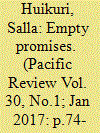

|
|
|
|
|
| Summary/Abstract |
Southeast Asia is one of the most underrepresented regions in the International Criminal Court (ICC). I address the question of non-ratification of the Rome Statute with a case study on Indonesia. While the Yudhoyono Administration has repeatedly promised to join the ICC, ratification has not materialized. I argue that Indonesia's tradition of emphasizing the protection of state sovereignty and economic gains in its foreign policy decisions best explains why it remains outside the ICC's jurisdiction. I test this claim by exploring Indonesia's human rights record, potential legal restrictions for the ratification of the Rome Statute, and the influence of domestic political players and external pressures.
|
|
|
|
|
|
|
|
|
|
|
|
|
|
|
|
| 19 |
ID:
130789
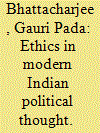

|
|
|
|
|
| Publication |
2014.
|
| Summary/Abstract |
Political _thought is concerned with the state, and the sovereign power of the state is legally unlimited, though it is not arbitrary. It is exercised with the objective of realizing some interest of the state. With the rise of the concept of democracy there arose, not only the importance of the individual but also the long struggle between state sovereignty on the one hand, and individual freedom on the other, ultimately giving rise to the concept of democracy. Democracy does not mean s-imply majority rule. It implies majority rule with full rights of all. The simple view of majority rule gave rise to the misleading concept of democratic dictatorship, and in a democracy an individual, even if he becomes a minority of one, is entitled to enjoy all the rights embodied in the constitution. Democracy therefore implies rights of all and rule by the majority opinion as ascertained periodically.
|
|
|
|
|
|
|
|
|
|
|
|
|
|
|
|
| 20 |
ID:
183779


|
|
|
|
|
| Summary/Abstract |
There is increasing agreement that states and other political actors on the world stage sometimes achieve international authority. However, there is less agreement about the nature and functioning of international authority relations. What determines whether an actor will be recognized as an authoritative actor? And what are the effects thereof? In this essay, we identify four distinct conceptions of authority in the study of international relations: authority as contract, authority as domination, authority as impression, and authority as consecration. Consideration of the typology leads to two important insights. First, the phenomenon of authority has an essentially experiential dimension. Subordinate actors’ emotional experience of authority determines their response to authority and thus also has a fundamental impact on the stability of authority. Second, the emergence of forms of international authority does not entail, at least not necessarily, the weakening of the sovereignty of states, but can equally be argued to strengthen it.
|
|
|
|
|
|
|
|
|
|
|
|
|
|
|
|
|
|
|
|
|